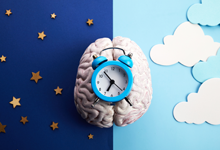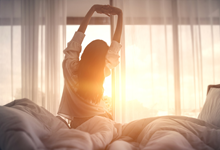
Spring forward, fall… asleep at your desk?
Daylight saving is just around the corner, and Hoag neurologist and renowned sleep specialist Jose Puangco, M.D., suggests preparing your body now for the under-appreciated effect that a shift in time can make.
“Sleep is a function of the brain, and the brain needs time to adjust to a new schedule. In fact, research shows most of us feel the effect of time changes for days after we reset our clocks,” said Dr. Puangco, service chief of Hoag’s Judy & Richard Voltmer Sleep Center and Irvine Sleep Center.
His recommendations?
 Go to bed 15 minutes early, starting several days before the March 12 shift. For the next few nights, go to bed 15 minutes earlier than the night before, until you hit your normal bedtime by March 13. “You’ll want to make an extra effort to be well-rested the week before the time change,” Dr. Puangco said. “If you need to catch-up with naps after the shift, limit them to 15 or 20 minutes in the early afternoon.”
Go to bed 15 minutes early, starting several days before the March 12 shift. For the next few nights, go to bed 15 minutes earlier than the night before, until you hit your normal bedtime by March 13. “You’ll want to make an extra effort to be well-rested the week before the time change,” Dr. Puangco said. “If you need to catch-up with naps after the shift, limit them to 15 or 20 minutes in the early afternoon.”
 Avoid sleeping in in the morning. “This is a common mistake, and it only serves to throw off your rhythm even more,” Dr. Puangco said. “The key to good sleep is consistency. If possible, I recommend waking up at the same time on the weekends, which can make Monday mornings easier to bear.”
Avoid sleeping in in the morning. “This is a common mistake, and it only serves to throw off your rhythm even more,” Dr. Puangco said. “The key to good sleep is consistency. If possible, I recommend waking up at the same time on the weekends, which can make Monday mornings easier to bear.”
 Take sleep seriously. There is a reason traffic accidents tend to increase around daylight saving time. “The hour lost causes sleep deprivation in most people, and can linger for days to weeks,” Dr. Puangco said. “This can affect learning and memory, metabolism and even cardiovascular health.”
Take sleep seriously. There is a reason traffic accidents tend to increase around daylight saving time. “The hour lost causes sleep deprivation in most people, and can linger for days to weeks,” Dr. Puangco said. “This can affect learning and memory, metabolism and even cardiovascular health.”
Want to learn more about how to make sleep health a priority? Reach out to a Hoag primary care physician at www.hoag.org, and set yourself up for a good morning!









